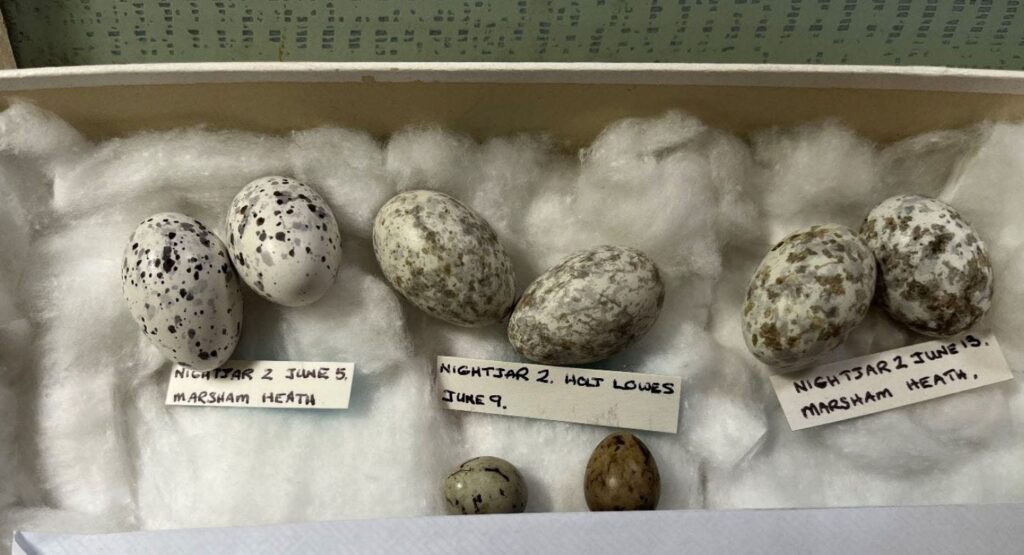In late February a serial egg thief admitted to illegally hoarding thousands of rare birds’ eggs he’d stolen. Daniel Lingham, 71, appeared at Norwich Magistrates Court where he pleaded guilty to five offences involving 2995 eggs, including taking eggs from a non-schedule 1 wild bird (a Nightjar) on 9 June 2023 at Holt, Norfolk.
He will appear for sentencing on 3 May 2024.
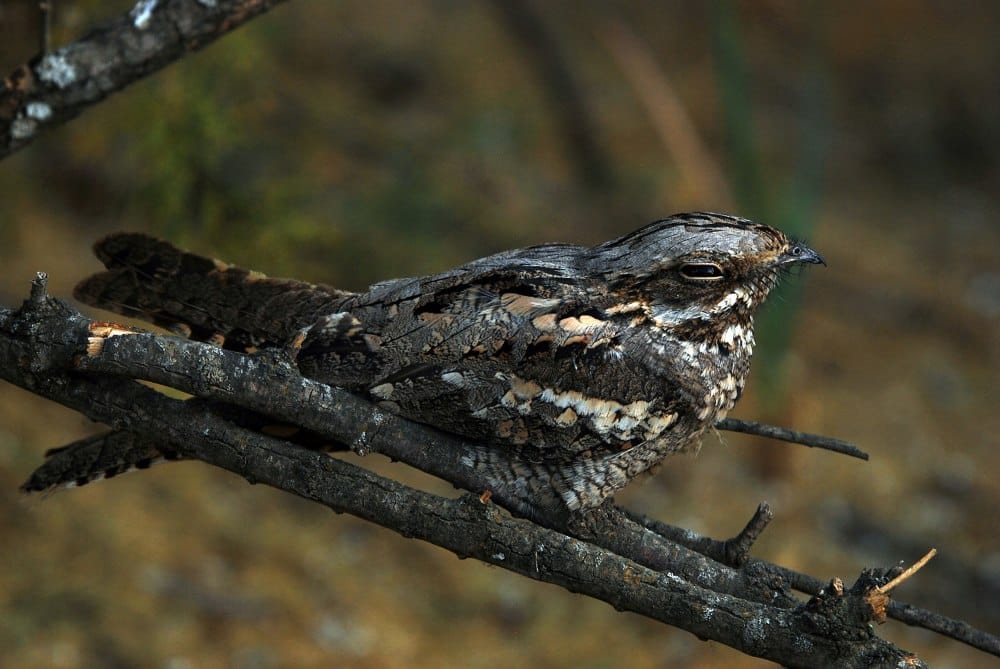
Caught on camera
Investigators shown the footage were able to identify Lingham by a distinctive walking stick which was seen in the video.
A police search of Lingham’s home on July 25 2023 turned up a total of 2995 eggs. A large collection in his bedroom included some non-native species, alongside 2429 native birds’ eggs protected by the Wildlife and Countryside Act 1981.
Of those 548 were from native birds on the Amber list of birds of conservation concern and a further 546 were on the Red list, the highest level of conservation concern and containing many seriously declining species. These included eggs from the nests of Linnet, Greenfinch, and Yellowhammer, House Sparrow (species once considered common but now in serious decline).
A further collection of eggs was found behind a bath panel including a box containing a pair of Nightjar eggs with a label ‘Nightjar 2, Holt Lowes June 9.’
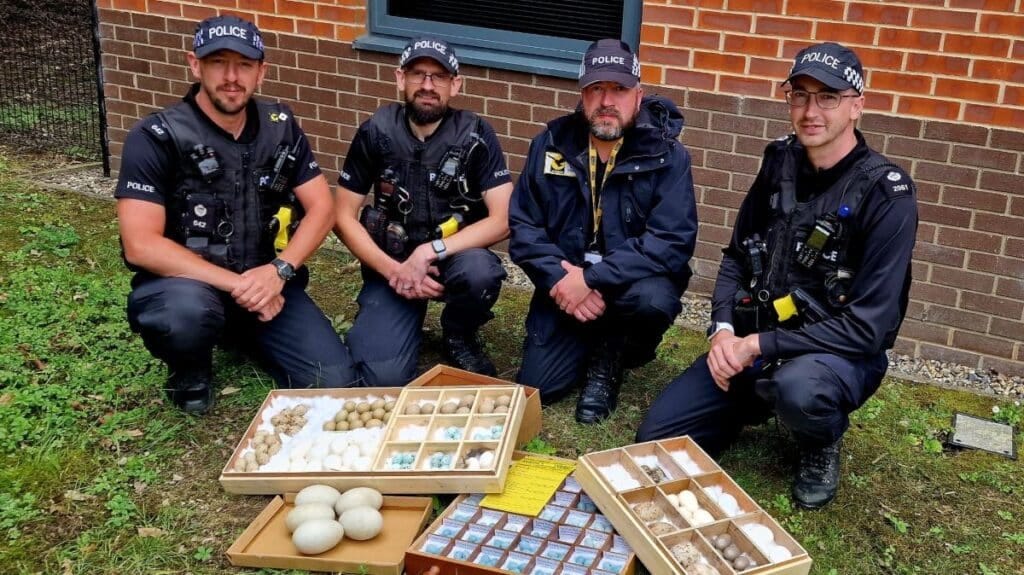
In an interview Lingham said all of the eggs, ‘bar the Nightjar’, had been taken prior to his previous conviction in 2018 – although to investigators the way they were stored suggested otherwise (in other words, he was lying).
He further claimed a collection on display in a cabinet in the bedroom had come from an Essex house clearance and while they were his he had not taken them himself from the wild.
Previous convictions
A brief look at his history shows how long his thieving has been taking place and the impact people just one person can have on wild birds:
- in 2005 he was jailed for ten weeks after police found a collection of around 4,000 eggs in his home.
- In 2018 he was found with over 5,000 eggs (including eggs from Marsh Harriers) and jailed for 18 weeks.
- Now, in 2023, he has been found with thousands more eggs of which 548 were from native birds on the Amber list of birds of conservation concern and a further 546 were on the Red list,
Lingham was previously handed a 10-year Criminal Behaviour Order (CBO) aimed at stopping him from committing similar crimes for at least the next decade, after which it was perhaps hoped he would be too old to continue (for an explanation of CBOs see our Protectors page Antisocial Behaviour and the Law). Under that CBO he was supposedly banned from entering Holt Lowes between 1 February and 1 October as well as many other sites across Norfolk and nationally – many of which appeared on place name labels among the boxes. Clearly Lingham thinks nothing of breaching that Order to commit wildlife crime.
Taking wild bird eggs has been a crime since The Protection of Birds Act 1954, and became an imprisonable offence with the passing of the Countryside and Rights of Way Act 2000. Hopefully the Courts will not take his casual ignoring of the CBO and his egg thieving as lightly as he does.
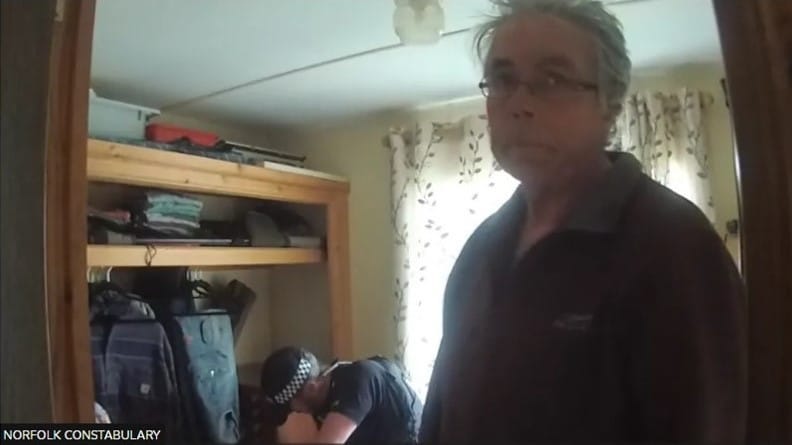
A ‘perverse obsession’ – illegal egg collecting
Birds of prey are especially targeted. Back in 2003 The Guardian published a story by Rose George that eloquently and memorably summarised the seasonal emergence of egg thieves:
It’s thieving season. Just like every year, when spring comes round, and – sure as snowdrops – the egg-collectors take their climbing equipment, their rubber dinghies and their perverse obsession up the M1, the A9, to whichever rare birds’ nests they’ve managed to locate. Once there, they will scale the tree or cliff and steal the eggs of an osprey, or a white-tailed sea eagle, or some other rare bird that needs all the breeding it can get.
The Osprey is a prime example and regularly figures in investigations and reports. The species was persecuted out of the UK in the early 20th Century with the last pair reportedly nesting in Scotland in 1916. The return of a pair to Scotland’s Loch Garten in 1954 was celebrated by birders and conservationists – and triggered a swarming of egg thieves that still goes on today.

Despite round-the-clock wardening, clutch after clutch of Osprey eggs has disappeared into the bags of the ‘inadequate men’. Writing in 2018 the RSPB’s veteran investigator Guy Shorrock described how in 1992 an egg thief from Merseyside stole past him and his colleagues in the dead of night to pillage two nests. The same man had raided four Osprey nests the year before.
When the notorious Colin Watson fell while climbing a tree to ‘check on a nest’ in 2006, his death brought to an end a series of raids on the nests of rare birds that saw him first convicted in 1985 when the RSPB raided his home and found more than 2,000 eggs, including – again – those of Ospreys and Golden Eagles.
In May 2018, Jason North pleaded guilty at Plymouth Magistrates to eight charges of disturbing rare breeding birds including Osprey, Golden Eagle, and Peregrine, and the taking of three Osprey eggs from Scotland. The offences took place in 2016.
After Lingham’s latest court appearance, PC Chris Shelley from the Op Randall Rural Crime Team (a team within Norfolk Constabulary focussing on rural and wildlife crime) thanked both the RSPB’s investigators for their huge support throughout the investigation and also the National Wildlife Crime Unit (NWCU).
He said:
“Egg collecting should be a hobby that is confined to the history books having been made illegal in 1954. The illegal collecting of eggs is tackled every year under Operation Easter with forces and partner agencies nationally taking part in bringing those involved to justice, all overseen and facilitated by the NWCU.”
Tom Grose, RSPB Investigations Officer, said:
“The scale of egg theft which Lingham has committed over the last 20 years is shocking. Sadly, his obsession with collecting wild birds’ eggs has ultimately resulted in thousands of breeding birds, which have invested huge amounts of energy into rearing young, to fail.
“We’re relieved that this type of crime is now relatively rare in the UK, but this latest case has revealed that the breeding success of the Nightjar, a species of conservation concern, has again been targeted in Norfolk by Lingham’s illegal actions.
“We’d like to thank Norfolk Police for an excellent investigation which has again led to Lingham’s prosecution.”
So what can we do to tackle the scourge of egg ‘collecting’?
As we’ve said, birds of prey are prime targets but as Lingham’s arrest proves any scarce and declining species might be on an egg thief’s radar
.However, if we are aware that egg thieving is a problem we can help prevent it.
It’s difficult to know just how many egg thieves there are in the UK, but we can be sure they will be on the prowl again at this time of the year – and that includes on social media.
- Egg thieves scour social media and follow birding accounts. If someone even posts sightings of rare species that may potentially breed the thieves will notice. Never post the location of a nest, and never respond to anyone you don’t know asking for details of nests or eggs.
While egg thieves are almost invariably male, it is their behaviour in the field that really gives them away.
- While most active when birds are nesting, egg thieves will repeatedly ‘scope out’ an area checking when territories start to be occupied or when male birds start displaying or singing again. Not everyone doing this is an egg thief of course (they could simply be a keen birder), but if we know that rare or scarce birds nest or have previously nested in an area, keep a look out for individuals carrying binoculars etc that we don’t recognise – especially if they are making repeat visits to the same site – and keep an eye on them.
- If we see anyone acting suspiciously – looking around to check if they’re being watched, searching in bushes or on the ground perhaps, or wading out to islands used by nesting birds (especially in the spring and summer during unsociable hours when few people are around) – they could be collecting eggs.
- If we are asked about whether a rare species is nesting or has started nesting yet, we should immediately be on our guard. Egg thieves typically carry much the same equipment as birders (optics, a field guide, a rucksack etc) but as ‘egg collecting’ has become more widely reported most birders will NEVER discuss nest locations.
- Egg thieves are not typically violent but don’t approach anyone committing any wildlife crime unless it is clearly safe to do so. The eggs of birds like Peregrines may be being stolen to order by a gang or syndicate for export to overseas falconry markets and they may be aggressive if approached.
- It is legal to photograph a car or registration plate when we think that the vehicle may be used in a crime. The police and investigators may well have a record of a vehicle that has been used by an egg thief in the past, so that information alone can be very important.
- Stealing the eggs of wild birds is a crime. If we are suspicious that we’re seeing egg thieving taking place ring the police on 999. If we have historic information call them on 101.
- We can also contact RSPB Wildlife Enquiries on 01767 693690. To contact RSPB Investigations directly use the online reporting form or email crime@rspb.org.uk. They will always try to help but have no enforcement powers and will refer the matter to the police for investigation if they think a prosecution is warranted.
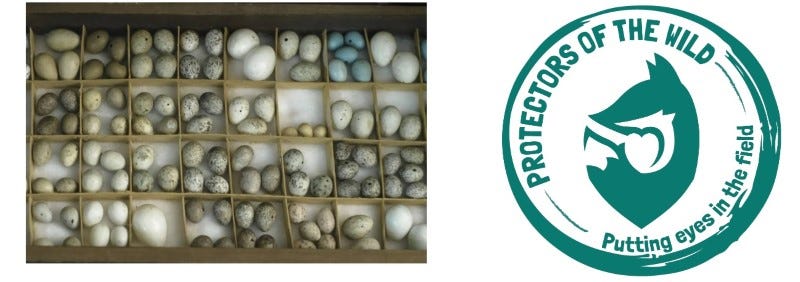
For more information please see our Protectors of the Wild page Wild Bird Eggs and the Law

